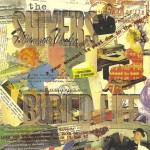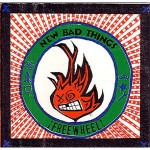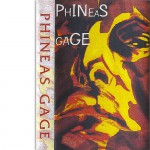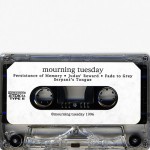Elemental Records
It’s either their chief asset or their fatal flaw, but Floater are an eclectic bunch. Oscillating between the hammer-fisted rage of cuts such as “The Face Of Order” or “Dead,” and the dreamy, pastoral nature found on “The Knowing Dirge,” “Pet” and “Bottle,” the band move through more mood swings than a hypoglycemic in a candy factory.
And all this is complicated by their indefatigable compulsion to initiate each and every track with an onerously dark and murky sound collage— consisting primarily of rumbling, thundery sounds: sometimes actual thunder, sometimes a heartbeat; commingled with dialogue sampled from television, or that to which we laughingly refer as real life. It’s a confoundingly heady mixture, to be sure.
Still, it is unredoubtably manifest that Floater have made massive strides, as a musical entity, since the release last year of Sink, their first CD. Their sound is more cohesive. They are far more developed and refined as an ensemble. The versatility they display does not dilute the band’s impact— though it does blur the focus somewhat.
While they clearly shine in the execution of their harder material, Floater’s obvious field of expertise lay in a more ethereal meadow. On “The Knowing Dirge,” bassist Rob lays down a pulsing, staccato line— reminiscent of Roger Watters during Floyd’s Meddle period. Guitarist Dave Amador’s thick, heavily chorused open chords hang as fog over the raindrop splashes of Pete Cornett’s ride cymbal.
“Cinema” utilizes aspects that recall Greg Lake’s stirring rendition of “21st Century Schizoid Man” from King Crimson’s first album, In The Court Of The Crimson King. The uplifting work of Trent Reznor also springs instantly to mind as a reference point as well. Cornett’s intricately syncopated drum patterns propel “All Stories But One,” a song that sounds something like the more recent work of Crimson or Adrian Belew.
Initially sounding not unlike “It’s A Boy,” from the opening montage of Tommy, “Clean Plastic Baby” eventually moves toward a harder sound, wherein Amador’s crunching guitars break over Cornett’s punchy drumwork. “Pet,” comes from a different mindset all together. Somber acoustic guitars set the tenor, as swirling vocals hover around the periphery. A well turned change of pace. “Persecutor” dances over Rob’s throbbing bass runs and Pete’s solid foundation of percussion. Amador contributes a soulful solo, making of this cut one of the most satisfying of the lot.
Equally thoughtful is “Bottle,” a tune nearly country in feel, but for the adventurous chord choices the band employ. “The Sad Ballad Of Danny Boy” sounds, at times, like Green Day covering a Johnny Cash tune. EeeeK! The moody listlessness of “Crawl Into You” accents Floater’s strength in creating an atmosphere. Here the atmosphere slides like melting wax down the sides of the sonic perspective.
Given the gains that Floater have achieved over the course of the past year, the future indeed seems very bright for this adventurous Eugene-based trio. Their work ethic appears to be commensurate with their musical proclivities, leading one to expect something big from these gents one day very soon. While Glyph is not that recording, it is well-crafted and heartfelt, and artistically challenging. The material is consistently thoughtfully earnest. A definitive step on the path toward success.
Restless Records
When the time comes, one wonders, what city will the Shivers finally call their own? The team of guitarist Carey Kemper and bassist Kelly Bell have bounced across the country and back again, in search of a golden tumbleweed. Certainly they know the centers to which to migrate. From Twin Cities to Austin to Portland; back to Austin and the Twin Cities again (where they are today). Now, after signing with a major independent label, comes this 14 song effort— illustrating the strengths the Shivers displayed in Portland (to not a whole lot of interest from grunge-addled locals. Small wonder the band left for greener pastures).
The Shivers specialize in a laid-back, hybridized form of New Western music; which sacrifices histrionics for an intensely subdued approach. Once upon a time, the work of John Prine, Townes Van Zandt and Tom Rush served as the foundation for this sound— though it promptly fell from public favor many years ago. A recent revival of interest in the form, brought about by bands such as Uncle Tupelo, and eventually Wilco ( and, to a certain extent on a local level, by our very own Haymaker).
Kemper and Bell divide the vocal duties— diverging from Carey’s homespun delivery to Kelly’s plaintively mournful articulations. “Shade The Light” sets the tone. Carey creaks and croaks like an old wood-plank floor; sounding a lot like Townes Van Zandt along the way. Kelly counters with a pensive reading of “House Of Spirits.” Backed only by a couple of acoustic guitars, her soft voice whispers “saffron, rosemary and nightshade/I hear the whisper of the moon/She says that no one lives forever/And that she’s coming for you soon.”
Kelly’s beautiful rendition of “Make A Wish” sounds like aural velvet as she sings “there is just one thing/to say before I leave you/Your spirit is your strength/It will never leave you/Is there any doubt/where it will take you?/Look at where you are now/and make a wish…” The arrangements of “Cannonball” and “Tumble Down Girl” share an upbeat rhythm and jangling electric guitar accompaniment behind Carey’s down-home vocal style. “Cult 45” might be about Elvis or Kurt Cobain, or Johhny Ace, for that matter— as Carey weaves a tragic tale.
The duet between Kemper and Bell on “No Love Lost” is a perfect re-creation of the sound that made Nancy Sinatra and Lee Hazelwood famous (or at least notorious). The combination is reprised on “Wind In Abilene,” a lonesome dove of a tune. Carey’s winsome dobro work adds to the forlorn essence of the song. With the bluesy “Dark Of The Moon,” Kelly’s vocal recalls venerable Folkies of years past— Joan Baez or Mary McCaslin.
The Shivers are not a band to blow you away with their spleen. Rather, they are as comfortable as a tall fir tree or a picnic table. In an age of skyscrapers and fast-food restaurants, this is more than merely a refreshing change. It is like a draught of cool, clear, mountain springwater.
Candy-Ass Records
Gee, just when you thought they couldn’t take it any farther, New Bad Things have reached the next plateau in their de-evolutionary approach to popular music. They remain P-town’s strongest purveyors of pedantic puerility in its essential Dadaesque state. Unfettered and uncomplicated by normal strictures of time and space, they are the Superheroes of the Anti-Hero League. They make average sound good, with Ivesian panache and a flair for randomly polygamous tonality.
If a band is going to take a stab at making a career of ingenuousness, the Bad Things seem like the logical candidates. Freewheel is a compendium of their work, comprising the span of the past few years; and contains all of their off-kilter hits (and misses).
And it’s hard not to like the kids. Many of their songs are quite catchy, if sloppy as well. In fact, there’s something appealing about nearly every track, which is cool since there is usually something annoying about each one as well. But the Things’ strongpoints— adventurousness, insouciantly good-natured antisocial attitude, brains and a sarcastic sense of humor, tend to outweigh their shortcomings; i.e. crummy equipment and an inability to tune it.
If one were going to attempt to describe NBT’s musical forays, they would seem to contain parts of Beck’s dark, fatalistically affable nonchalance, Zappa’s sense of the socially absurd and a general cynicism associated with many X’ers.
Perhaps their credo is best stated in Matthew Hattie Hein’s poignant opus “Goethe’s Letter To Vic Chesnutt.” “Let me put it to you this way/ you will be hit by a truck/You will fall off your bicycle/And no one will recall how you were/except your friends and enemies/And all the stuff you should have written/’Bout times when you’ve been sick or smitten/Will mean as much to me as your corpse.” Hein’s sparse, ambivalent acoustic guitar is backed with a moaning ambulance of a guitar sound and a jaunty banjo, as he lays out his viewpoint. “Let me put it to you this way/I’ve been writing songs for almost seven years now/And I haven’t said a single thing/Of lasting import or social significance.”
One wonders why social significance should be an issue, but Matthew is a troubled guy. His accounts of life in “the hospital” on “Krankenhaus” would seem to come from knowledge gleaned first-hand. “At the hospital/ if they mug you, all they get/is your cigarettes;” which is a 21st century haiku, if ever there was one.
But it’s the uptempo stuff that grabs your attention. “Ephedrine” circulates around
sticky Dave Friendly’s snappy drumbeat and Prince Mattie Gaunt’s smudgy basslines— generating a decent 90s imitation of Stones Watts and Wyman doing a version of Lou Reed’s “Sweet Jane.” And speaking of Lou, does anybody else notice the distinct similarity between NBT’s “Josh Has A Crush On A Femme From Reed” and the Dandy Warhols’ “Lou Weed?” Sounds like the same pilfered chord progression to me.
“Camp 18” resembles the Mothers Of Invention, circa We’re Only In It For The Money. Lars Holstrom’s braying trumpet bellows above Gaunt’s sprinting bassline, while the vocals sound as if they were performed by creatures from the dimension where insects rule. In that vein, the screwy, skewed ska of “Let’s Everyone Do It” would appear to benefit greatly from a penchant for the variable speed knob NBT share with Saint Frank.
“Detective” is especially cool. “How many detectives does it take to screw in a lightbulb/Well I guess that depends on what you mean by the term lightbulb/I’m a detective, back off/It’s my business to know. alright?”
New Bad Things seem unwilling to take themselves too seriously, which is, of course, a totally rational stance in the field of Pop Music. But at the same time, they appear to be more capable than most at constructing (or de-constructing, in some instances) intelligent, meaningful compositions— though one might pause to doubt at lines such as: “Of all the beverages I could choose from/You’re the one I want put in my lunch/You’re better than Dr. Pepper/You’re sweeter than Hawaiian Punch,” delivered in a context similar to that which is currently being goldmined by the Presidents Of The USA.
Still, Popular Music is moving away from the flannel flavored ravings of the grunge set, toward a cheerier, more optimistic sound. While the ascerbic outlook they display would seem to be at odds with the trend, New Bad Things share a musical frivolity that has been missing for some time. A refreshing predilection, to be sure. Now, if only they could learn to tune their instruments…..
Self-Produced
Here’s an exciting new quartet fronted by two talented young women who sing, play guitar and write compellingly perceptive, acutely astute songs full of insight, emotion, passion and sensitivity; as well as a wry sense of humor. Comparisons to Throwing Muses, Lush, Juliana Hatfield, the Breeders and Veruca Salt are fair, as far as they go. But it’s hard to tell where Phineas Gage may end up. They improve by leaps and bounds every time they play.
The five songs presented here are but a hint of what the band has demonstrated on the live stage, since recording this effort. Still, their many strengths are everywhere to be found. There is not a bad song in their repertoire.
Heather Savoy moved to Portland from the Boston area last Spring, bringing with her an artist’s sensibilities and a spirit for the guitar. That she linked up so quickly with another talented songwriter in Jody Garner would be considered more than fortuitous. Fateful, perhaps. In the rhythm section of Ben Brown on bass and Tim Reese on drums the two women have found complementary counterparts.
“Shame” honestly inspects the hollow lives of troubled souls who are imprisoned by the choices they make. “She is not a pretty girl/Only friends are the men she brings home/They all leave her lying there/In her bed all desperate and alone/She’ll just take all that pain/Put out her arm and stick it in a vein/Now she feels nothing/ but the numbness of her own shame/what do you do with your shame?” A strong chorus renders this song instantly memorable. Heather’s guitar solo in the break is a perfect barometer for her own rapid technical improvement. She plays it a lot better now, though this rendition is not without its own appeal. Reese’s punchy percussion and Brown’s motile bass propel with finesse, the song toward a dramatic finale.
Jody’s charming “Life On Mars” is a delightful treatise, in which she cites noted authorities on the subject, and conjectures as to the viability of relocating herself to another planetary locale. “Finding a planet like ours/with more favorable conditions/would take all of my energies/Would take less ambition/I don’t know why/I don’t try.” Heather’s sweet solo nicely augments Jody’s angelic vocal.
Heather returns with the rousing rocker “Strong.” Another vibrant chorus marks this tale of ambivalence and refuge. Chunky guitar wedges serve as the framework. Jody’s “Snakespit” is a pensive introspection into the tension and violence two people can generate; wonderfully delineated in the image of a rubberband around the wrist. The band show restraint in their audio noir approach to the arrangement. A very intelligent and affecting piece.
“Real Writer” is Jody’s biting portrayal of a self-indulgent figure— obsessed with his own reality. “Shotgun wedding/Rats in the pantry/Bottled up your words/Saved them for rationing.” Reese’s maniacal drumwork contrasted against a whimsical guitar riff makes for a Muses/Breeders sort of feel. Very cool.
I recently inquired of Heather as to the origin of the band’s peculiar name— to which she matter-of-factly replied: “Phineas Gage was this kind of famous guy from sometime in the 1800s. He worked on the railroad and a pole went through his eye into his brain. He lived, but he lost all moral judgment.”
Well, it’s not our business around here to pass moral judgment on anyone. But, from a musical standpoint, Phineas Gage are a band of many attributes, whom are sure to flower profusely in our fair dell throughout the coming year. Expect great things from them.
Mourning Tuesday—Mourning Tuesday
Self-Produced
Mourning Tuesday are another band to watch in 1996. They don’t seem to play around town very much, but their live performances, too, reveal a band, in its embryonic state, which one day very soon will emerge as an eagle. Their sound is powerful and soulful, in a stirringly real way. Fans of Jeff Buckley, Counting Crows, Dave Matthews, Afghan Whigs, Live; and even the Doors or Jethro Tull will find kindred threads running through the musical fabric of this promising young quintet
Joel Middleton, lead vocalist and acoustic guitarist, acts as the fulcrum. Dave Noyes on Keys and Jason Rodgers on electric guitars swing in the balance; while drummer Evan Louden and bassist Josh Jade create the foundation beneath each enfolding drama.
“Knowledge” skips into focus upon Joel’s roiling acoustic guitar and Evan’s thundering snare; while Dave’s piano rumbles beneath. “Knowledge/She holds the key/Christians and idiots agree.” The band explore deeper regions in the bridge. Noyes’ piano crosses restlessly, fluttering upon shimmering arpeggios. Rodgers’ moony solo leads into a crashing chorus. Though full of vitality, their songs ebb and flow through a range of emotions and dynamicality of coloration.
The lush feel of “Sara” rolls upon Noyes’ dancing piano filigrees; unfurling like a red silk ribbon across a mound of hay. Joel’s impassioned vocals ride the crest of flashing waves of organ and electric guitars which whip windily across the horizon. “Inside,” which was featured on the recent Live From Mt. Tabor CD release, neatly showcases Mourning Tuesday’s forceful intensity. Jason’s dizzy wah guitar spins around Dave’s puissant piano tumult and Joel’s jaggedly ragged vocal for a volatile exorcism of spleen.
Joel’s solitary acoustic guitar wobbles beneath his voice on “Crutch.” Stress builds through the verses, as waltzing keys and guitars float above a low, moaning drone. The chorus collides like an advancing storm front into a violent upheaval, before resolving into final calm.
Mourning Tuesday have all the necessary tools to make a big impact upon the Portland music scene in 1996. Their rough hewn quality does nothing to dispel that notion, in fact only furthers to enhance it. It is indisputable that their presence will be felt for some time to come.
Self—Produced
Juliet Wyers is yet another new voice on the scene, who gives rise to a lot of promise for the future. Here, her rich contralto is lent to four songs, backed only by her jangling acoustic guitar.
Her treatment of Shawn Colvin’s “Kill The Messenger” bespeaks an artistic influence, though Juliet’s voice is softer and sweeter, though nonetheless effective. “Taiko” is a clearer portrait of her own keen powers of observation. “Weddings are only partly awful after all/only partly about statistics/Pay attention to the part about hope/This couple here is different/This couple here will make it/make it to a place they like/But I sit here deafened by the sound of what’s not said/our huge dark incomplete hearts/won’t stop bounding the air.” The precision of her emotionally incisive candor is disquieting in a way very similar to that of Joni Mitchell and our very own McKinley.
Juliet’s impeccable ability to turn a phrase is further evidenced on “Leap.” “You, your eyes are miles from here/They smile, it’s good, cross over/I’m folding my everything/is packed. It’s on the pier/If the life we choose banters at us until what’s not essential…/Do our choices just fall away/I want to weather like you/I want the bones of my desire/to stick out/declaring my soul to the world.”
She is a private person, of spirited self-inspection, but Juliet Wyers is a talent of no small import. She combines a masterful poetic sense with vibrant acoustic guitar work and a marvelously evocative vocal instrument, to flesh out vignettes of piercing forthrightness and sagacity. Hers is a rare gift.






